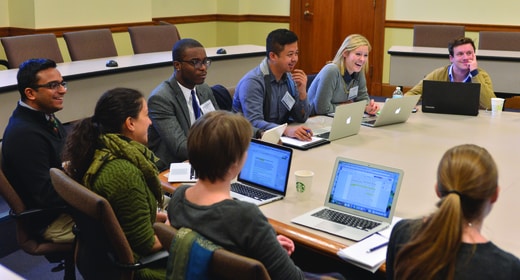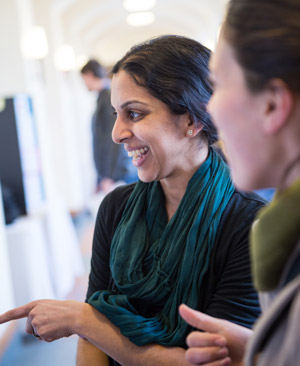
A research manager at the Ford School’s Education Policy Initiative (EPI), Mahima S. Mahadevan (MPP ‘11) is leading the implementation of a major study on Michigan’s charter schools. Preliminary findings will be released in early 2016. Mahima has lived in Detroit for eight years.
S&H: Your thoughts about the Detroit Public Schools?
MAHIMA S. MAHADEVAN: Defunding of schools, population change, joblessness, all these things have made [Detroit’s schools] very vulnerable right now. It’s important to understand that policies played a role.
The changes are happening very rapidly. I think for a lot of people, it feels like they’re being hit from multiple angles. So for example, you had the water shut-offs in Detroit. You’ve got all the foreclosures going on. So these are folks who might already have challenges with jobs, and now they’re losing access to some really basic supports like water, housing, and [with recent school closures] education.
Going forward, what I get really excited about is that there are strong, active, loud parents and educators and students that are advocating and fighting for their education. These aren’t policy students or professionals, necessarily. We’re talking about people where this is their life.
S&H: Are you from Detroit?
 |
MAHADEVAN: No. I grew up outside of Detroit, and had the typical suburban experience of having very little connection to Detroit. It wasn’t until I’d moved to Detroit and been there a long time before I started getting in touch with what it meant to be a person of color, to specifically organize against anti-Black racism.
Detroit has been my fantastic institution of education. I feel like I’ve learned so, so much living there. People there have been very generous with me in terms of all the mistakes that I’ve made (laughs)—people and friends, community members, have been very willing to realize that we need one another. That’s something I feel I could only get in a community such as Detroit.
S&H: More alumni now stay in Michigan, and Detroit in particular. Thoughts?
MAHADEVAN: I’m very proud that more students are leaving here considering Detroit, but I feel there needs to be more thinking that it’s not just ‘what do we have to offer to Detroit,’ but also, ‘what does Detroit have to offer to us?’
Students come from Ann Arbor with fantastic skills and the best education. But how do we also find a listening component to policy—to make sure we’re actually able to hear what others are saying versus projecting or imposing what we think. With policy, you have the potential to make such a dramatic impact; do you have the ability to get input from the people who will be impacted, to hear their stories?
S&H: What’s your pitch for graduates to consider the Motor City?
MAHADEVAN: I would sell Detroit as: I have met the most incredible people, folks that are so sharp, have such a strong foundation and history—like a peoples’ history. They have great stories and great experiences. And they’re people that critique the system in a way that we don’t usually hear in a traditional educational setting.
There’s something about the mix of people coming out of the civil rights era—a lot of the elders in Detroit, young people that have been raised with a very strong social justice orientation, and then just superb diversity.
But (if you come,) see what’s going on first, because there is a lot going on outside of the traditional development model, a lot going on in terms of, as Grace Lee Boggs would say, ‘reimagining our city’.
Below is a formatted version of this article from State & Hill, the magazine of the Ford School. View the entire Fall 2015 State & Hill here.